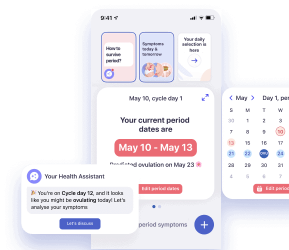Femia > Health Library > Being a mom > Raising a baby > 9-month sleep regression: Why your baby isn’t sleeping and how to fix it
9-month sleep regression: Why your baby isn’t sleeping and how to fix it

- Updated Feb 25, 2025
- Published
CRAFTED BY HUMAN
Crafted by human At Femia, we provide accurate and up-to-date information at every stage of your journey, from trying to conceive, pregnancy and postnatal support. All content is created by a real person based on in-depth research and own professional experience. Femia ensures that you will receive expert advice, strict accuracy and a personalized approach from our authors/medical experts. Learn more about our editorial policy.
FACT CHECKED
Fact checked At Femia Health, we maintain the highest standards of editorial excellence in delivering content focused on helping you conceive, guiding you through pregnancy, and supporting you postpartum. Explore our content review principles to learn how we ensure the accuracy and quality of our health and lifestyle tips for every stage of your journey.
The 9-month sleep regression is a temporary change and disturbance in your baby’s sleep schedule followed by frequent wakings at nights, shorter naps, difficulty falling asleep, and increased crankiness and fussiness.
Sleep regression in a 9-month-old baby typically happens because they are experiencing and adjusting to physical and cognitive developmental changes, teething problems, and changes in their sleeping requirements as they grow. It commonly lasts for a few weeks.
Tips to manage the 9-months-old sleep regression include creating a consistent bedtime routine, and encouraging self-soothing techniques by avoiding sleep dependencies, like rocking or feeding, to sleep. Ensuring that your baby is well-fed, burped, clean, dry, and comfortable before sleep and providing a quiet, peaceful and dark sleep environment will also help.
9-month sleep regression in children? Yes, there is. It happens because, at this age, your baby’s brain is constantly working to develop and process new abilities—like rolling, crawling, sitting, feeding, and more—which can cause restlessness and frequent waking throughout the night, leading to sleep regression.
If your 9-month-old is not sleeping through the night, this article is for you. So, let’s discuss 9-month-old sleep regression in detail, including its causes, symptoms, tips for management, and more.

What is the 9-month sleep regression?
The 9-month sleep regression is a temporary phase when your 9-month-old baby stops sleeping well like before. It is accompanied by a disruption in their sleeping patterns, like short naps or frequent waking at night.
Sleep regression typically happens at 9 months, because the baby’s brain and body are taking a developmental leap, like processing information, learning to crawl, or even taking their first steps. Moreover, your baby may also experience teething discomfort at this age, which can cause or aggravate sleep regression.
So, how long does 9-month sleep regression last? It can last somewhere between 2–6 weeks, but every baby is different. The timing can vary, depending on how quickly they develop healthy and proper sleeping habits.
👉Find out more: Can you take antibiotics while breastfeeding? What you need to know
Signs and symptoms of the 9-month sleep regression
What does 9-month sleep regression look like? Here are the common signs and symptoms of 9-month-old sleep regression:
- Shorter naps
- Frequent waking at night
- Excessive crying, fussiness, or crankiness
- Suddenly refusing to sleep
- Difficulty sleeping.
Why does the 9-month sleep regression happen?
The 9-month sleep regression can have various causes, including:
1. Developmental changes
The major cause of sleep regression in a 9-month-old baby is physical and cognitive developmental changes. They are constantly learning new abilities, processing information, and understanding and accepting life in a new way, which can cause sleep regression or disrupted sleep for some time.
2. Separation anxiety
Nine months is around the age when a baby gains an awareness and understanding of their parent’s presence and importance. Hence, they may feel anxious about getting separated from their moms even for a while, which may cause sleep disturbances.
3. Teething
Most babies start teething at around 4 months, and the process can continue on and off up to 12 months, or longer.
Babies’ top lateral incisors typically come through at around 9–11 months, which can cause disturbance during their 9-month sleep schedule.
4. Changing sleep needs
As babies grow, their sleep needs are reduced. For example, when a baby is 4–12 months old, they may sleep for 12 to 16 hours a day, including naps. But, when they reach 12–14 months, their sleep may reduce to 11 to 14 hours.
A sleep transition at 9 months can disturb the baby’s sleeping schedule and cause sleep regression.

How to manage the 9-month sleep regression
The common tips to manage 9-month-old sleep regression include:
- Make sure your baby is clean, dry, well-fed, and burped before sleeping. Moreover, if they have congestion or some other illness, make sure to address their issues before sleep, like giving medicines after consulting a doctor or cleaning their nose before sleep.
- Understand your baby’s breastfeeding requirements. Try not to overfeed to avoid stomach issues at night.
- Maintain a solid and consistent bedtime routine by providing a peaceful, quiet, and dark sleep environment for your baby.
- Remove toys or gadgets from their sleeping area that may cause noise or disturbance during sleep.
- Put your child to bed when they are drowsy but awake and avoid sleep dependencies, like feeding or rocking, to sleep.
- Make sure your baby has some physical activity during the day, like crawling exercises, tummy time, bath time play with toys, sitting with support, rolling back and forth, or others, according to their individual abilities.
👉Find out more: 10 foods to avoid while breastfeeding: What to skip for a healthy baby and milk supply
When to seek professional help
You should seek professional help for your baby’s sleep regression if:
- The sleep regression or disturbance lasts longer than 4–6 weeks.
- Your baby experiences sleep regression with other symptoms, like breathing difficulties, blocked nose, fever, weight loss, extreme fussiness, or other illnesses.
- Your baby is eating less than normal.
Questions from the Femia community
Should I let my 9-month-old cry it out during sleep regression?
Yes, you can try the “cry-it-out” method during sleep regression, but it is important to respond to your baby's cues if the crying persists for longer than usual, because they may be uncomfortable due to some other reason, like pain, hunger, or gas.
Should I change my baby’s sleep schedule during this regression?
It is recommended to stick to your normal sleep and bedtime routines during regression.
How do I know if my baby is waking from hunger or habit?
You can analyze if your baby is waking from hunger or habit by trying to feed them. If they take a full feeding when offered, they may be hungry, but if they are just sucking randomly, it may be a habit.
The bottom line
The 9-month sleep regression happens because your baby is going through cognitive and physical developmental milestones, which may cause a disturbance in sleep schedules. It also occurs if your baby is experiencing teething or changes in sleep requirements.
The common symptoms of sleep regression in babies include difficulty falling asleep, crankiness or fussiness, shorter naps, and frequent waking at night.
Sleep regression commonly occurs for 2–6 weeks, but if it lasts longer or is accompanied by other symptoms—like breathing difficulties, blocked nose, fever, extreme fussiness or crying or other illnesses—it is crucial to contact your doctor.
The common tips for managing sleep regression are to maintain a consistent bedtime routine for your baby by offering a peaceful, quiet, and dark environment; make sure your baby is well-fed, clean, dry, and comfortable before sleep; and ensure some physical activity for your baby during the day, like tummy time, movement, crawling, sitting with support, or others.
References
- Choc. “Everything You Need to Know About 9-month Sleep Regression.” Children’s Hospital of Orange County, 23 Sept. 2020, choc.org/news/everything-you-need-to-know-about-9-month-sleep-regression.
- “What Developmental Milestones Is Your 9-month-old Reaching?” Centers for Disease Control and Prevention, 26 Sept. 2024, www.cdc.gov/ncbddd/actearly/milestones/milestones-9mo.html.
- Website, Nhs. “Baby Teething Symptoms.” nhs.uk, 7 Mar. 2024, www.nhs.uk/conditions/baby/babys-development/teething/baby-teething-symptoms.
- “How Much Sleep Kids Need: Recommended Hours by Age.” Cleveland Clinic, 24 Sept. 2024, health.clevelandclinic.org/recommended-amount-of-sleep-for-children.

Curious if you can eat goat cheese while pregnant? Learn whether goat cheese is safe during pregnancy, how to check for pasteurization, and which types to avoid.

Orgasm occurs at the peak of sexual arousal. The brain releases hormones during orgasm that play a vital role in the pleasure, connection, and relaxation that follows.

Kansas has filed a lawsuit against Pfizer, alleging misinformation about its COVID-19 vaccine’s safety and effectiveness, including during pregnancy. Learn more about the claims, evidence, and implications.

